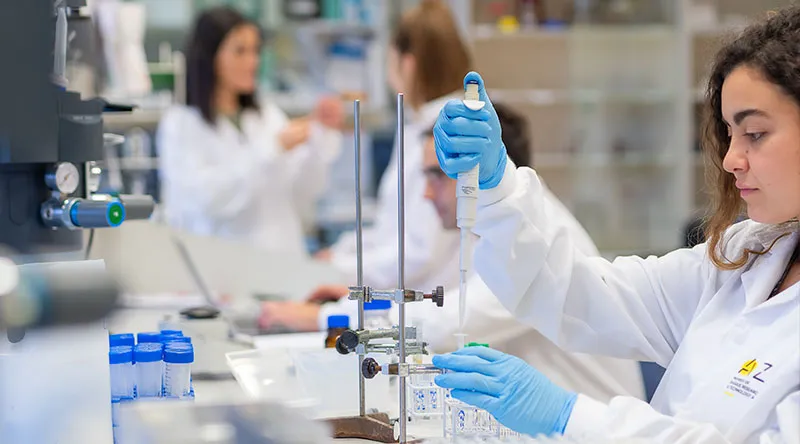

Edukien aurkibidea
Bilbo, 2025eko azaroaren 6a. AZTIk koordinatutako eta AINIA, ANFACO-CYTMA, EURECAT eta CNTA zentroek osatutako OPTIPROT CERVERA Bikaintasun Sareak bi urteko lankidetza-lana amaitu du, Espainiako elikadura-industriaren lehiakortasuna eta jasangarritasuna indartzen dituzten aurrerapenekin.
Zientzia, Berrikuntza eta Unibertsitate Ministerioak, CDTIk eta Europar Batasunak finantzatutako proiektu honek (NextGeneration EU/PRTR funtsez baliatuta) ezagutza aitzindaria sortu du proteina alternatiboen erabileran eta osasun pertsonalizatura eta jasangarritasunerako bideratutako teknologia omikoen aplikazioan.
“OPTIPROT proiektuak erakutsi du teknologia omikoetan oinarritutako zientzia lankidetza gai dela benetako irtenbideak eskaintzeko, industriak elikagai osasungarriago, jasangarriago eta lehiakorragoak garatu ditzan”, adierazi du Itziar Tuerosek, AZTIko Elikadura eta Osasun arloko arduradunak eta Sarearen koordinatzaileak.

OPTIPROTeko kideek aurrerapen garrantzitsuak lortu dituzte proteina-iturri alternatiboen ebaluazioan, hala nola mikroalgetan, arrain- eta brokoli-azpimultzoetan, almortan eta algarrobean, frogatuz osagai horiek proteina konbentzionalen aminoazido esentzialen biodisponibilitate bera eskaini dezaketela.
Ikerketa kliniko eta aurreklinikoek egiaztatu dute proteina horien eraginkortasuna muskulu-metabolismoaren hobekuntzan eta sarkopeniaren prebentzioan, baita hesteetako mikrobiotaren modulatze positiboan ere.
Teknologia omikoen erabilerari esker, biomarkatzaile berritzaileak identifikatu dira nutrizioaren jarraipen pertsonalizaturako, eta hartzidura eta prozesatze-teknologia aurreratuek landare- eta mikroorganismo-proteinen kalitate nutrizionala eta funtzionala hobetu dute.
Emaitza horiei esker, OPTIPROT sarea elikagai funtzional jasangarri eta pertsonalizatuen berrikuntzan erreferente bihurtu da, etorkizuneko nutrizioaren erronkei egokituta.
Beste lorpen aipagarri batzuen artean daude:
Gainera, ingurumen-inpaktuaren eta bideragarritasun ekonomikoaren azterketek erakutsi dute eskala industrialeko potentziala eta ekonomia zirkularrean duten ekarpena, elikadura-segurtasun europarra indartuz eta balio-kate berriak sortuz industriarentzat.
Konsortzioak, halaber, kontsumitzaileen portaera aztertu du proteina-iturri berrien aurrean, bizimodu-faktoreak eta produktu alternatiboen onarpena kontuan hartuta. Ikerketek elikagaien onarpen sentsoriala eta emozionala ebaluatu dute, trantsizio proteiko informatua eta inklusiboa sustatuz, gizarte- eta jasangarritasun-erronkei erantzunez.
Ildo berean, 50 eta 75 urte bitarteko 200 pertsonarekin egindako azterketa kliniko, omiko eta biokimiko konbinatu batek talde-mailako nutrizio zehatzaren ezagutza zabaldu du. Etorkizunean, ikerketa horrek populazioaren estratifikazioa eta adinekoentzako elikadura-gomendio zehatzak egiteko aukera eman dezake, adinarekin lotutako muskulu-masa, indar eta funtzioaren galerari aurre eginez, osasuna eta ongizatea hobetzeko.
OPTIPROTek transferentzia teknologikoa eta emaitzen ustiapena bultzatu ditu negozio-ereduen, berrikuntza irekiko estrategien eta ACELERÓMICA azelerazio-programaren bidez.
Proiektuak sekretu industrialaren eta patenteen bidez babestu ditu aktiboak, eta spin-offak sortzen lagundu du, hala nola LIPIWELL SL. Osagai eta elikagai osasungarrien sektorea ere dinamizatu da, zerbitzu berriekin eta enpresa-zentro teknologikoaren lankidetzarekin.
“Industriak proteina alternatiboetan berritzeko tresna azkarrak eta fidagarriak behar ditu. OPTIPROTek oinarriak jarri ditu garapen-denborak murrizteko eta produktu berrien merkaturatze-bideragarritasuna handitzeko”, adierazi dute kontsortzioko kideek.
Proiektuaren garapenean zehar, nazioartekotzea ardatz estrategiko bihurtu da: 70 enpresari lagundu zaie, eta haietatik 22k finantzaketa europarra lortu dute.
Sareak networkingeko 263 ekitalditan parte hartu du, eta nazioarteko 110 proposamen aurkeztu ditu Horizon Europe, Interreg, PRIMA, Erasmus+ eta Eurostars programetan, 20 proiekturen finantzazioa lortuz eta hoietatik 18 zentroek berek gidatuta.
OPTIPROTek, gainera, talentu zientifiko eta teknikoaren prestakuntzan lagundu du: 15 tesi doktorego, 90 master- eta graduko praktika eta egonaldi baino gehiago gauzatuz Sareko zentroetan.
Konsortzioak berdintasunaren eta inklusioaren aldeko ekintza horizontalak ere bultzatu ditu, zentro bakoitzeko plan espezifikoekin, I+G jardueretan emakumeen ordezkaritza handiarekin eta ezgaitasuna duten pertsonen parte-hartze aktiboarekin, ingurune zientifiko-teknologiko anitz eta inklusiboa sendotuz.
Gainera, teknologia omikoak eta proteinen elkarbizitza sozializatzeko helburuarekin, kontsortzioak komiki dibulgatibo eta hezitzaile bat sortu du, proteinek gure elikaduran duten garrantzia modu atsegin, bisual eta eskuragarrian azaltzen duena.
OPTIPROT AZTI (koordinatzailea), AINIA, ANFACO-CYTMA, EURECAT eta CNTA zentroek osatutako CERVERA Bikaintasun Sarea da. Bere helburua da teknologia omikoen —hala nola metabolomika, proteomika eta transkriptomika— aplikazioa sustatzea, elikagaiek eta haien proteina-konbinazioek osasunean eta ongizatean duten eragina ulertzeko.
Sareak elikagai hibrido osasungarriago, jasangarriago eta erakargarriagoen garapena bultzatzen du, animalia-, landare- eta jatorri alternatiboko proteinen konbinazio adimendunean oinarrituta.
Era berean, ezagutza-transferentzia indartzen du enpresa-sektoreari, talentu zientifiko eta teknikoaren prestakuntza sustatzen du eta nazioarteko lankidetza bultzatzen du etorkizuneko elikaduraren arloan.